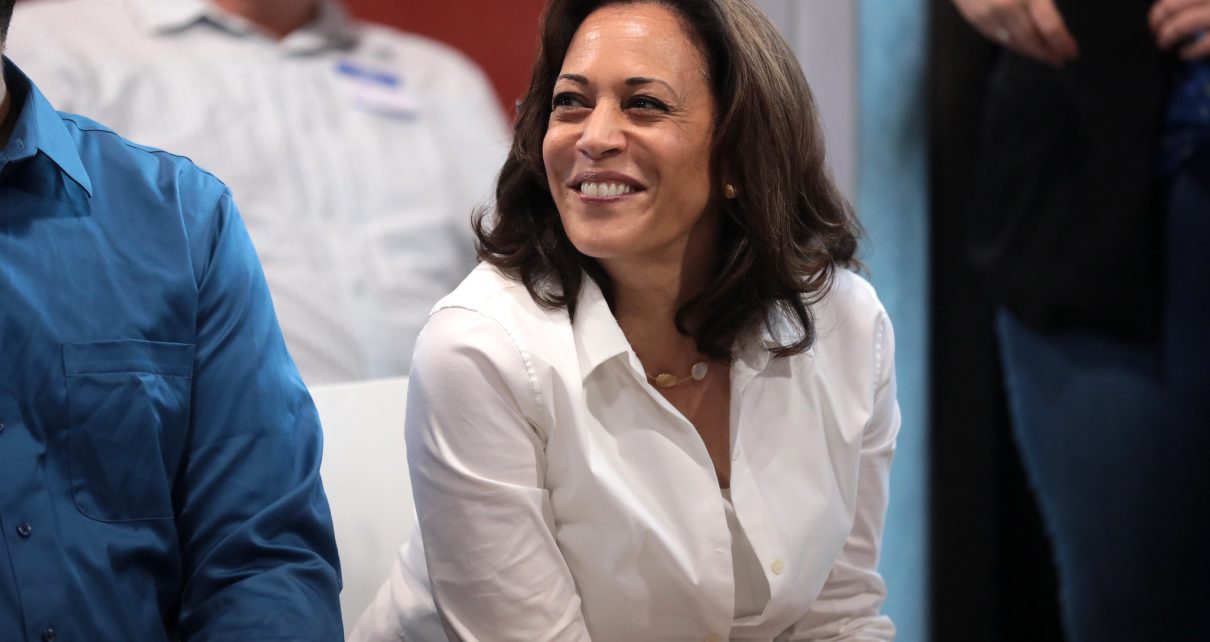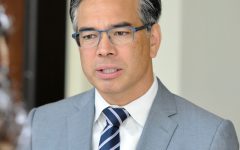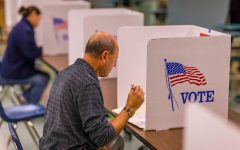
U.S. Senator Kamala Harris at a fundraiser hosted by the Iowa Asian and Latino Coalition at Jasper Winery in Des Moines, Iowa. August 10, 2019. (Photo: Gage Skidmore)
About Last Week… Ballot Language, Ballot Place
Current Attorney General Rob Bonta, however, seems to be trying to take a page out of Kamala’s book
By Thomas Buckley, May 6, 2024 2:45 am
In 2014, then-Attorney General and now Vice President of the United States of America Kamala Harris – wow … when you type out the entire title it seems even more unbelievable – created a wholly fictitious ballot title for the California-killing Proposition 47.
As the state’s attorney general gets to write a ballot title for each proposition, they are in a very unique position to put a thumb or twelve on the electoral scale. Harris dubbing Prop 47 the “Safe Neighborhoods and Schools Act” unquestionably tipped more voters in favor rather than voting against the idea of dropping a bunch of felonies to misdemeanors and easing drug laws to the point where they are practically useless.
The proposition did win by 20 points – utterly amazing – so whether or not Harris’s blatancy made the crucial difference may not be entirely why it passed, but still it helped.
Current Attorney General Rob Bonta, however, seems to be trying to take a page out of Kamala’s book and has created a ballot title that is clearly meant to drive votes away from a proposition that would address the ballooning “trans teens” issue by barring sex change operations for kids, prohibit schools from hiding a child’s gender identity crisis from parents, and draw a bright biology-based line when it comes to sports and facilities.
Exactly what will be the final ballot title for the proposition as it is winding its way through the courts – the proponents appealed a ruling allowing it to stand last week – but the so far it seems Bonta’s “Restricts Rights of Transgender Youth” will be the official name of what proponents called the “Protect Kids of California Act of 2024.”
Those are two very different titles to exactly the same proposition – this is not a difference between “fire truck red” and “brick red,” but a difference between blue and yellow.
But, politically, is the “Restricts Rights…” title as disastrous as it sounds? Being California, we hate (supposedly) the restrictions of rights – well, some of them anyway (feel free to restrict speech, say progressives like Bonta.)
Following up on that thought, I asked the AG’s office if the new title was focus grouped – i.e. taken for a bit of a political test drive via polling, etc. to see if it would intentionally turn off voters.
Here’s the answer I got:
“Thanks for reaching out. Under California law, the Attorney General’s Office is responsible for issuing official titles and summaries describing the chief purpose and points of every proposed initiative submitted in compliance with procedural requirements. We take this responsibility seriously and stand by our title and summary for this measure.”
In case helpful, please see a copy of the court’s final ruling denying the petitioner’s request. Beyond that, we will let the document speak for itself.”
That doesn’t say “no,” now does it?
But the funny thing is, parents who pay attention (I know, that’s not as large a group as it should be) do not inherently react negatively to their teenager’s rights being restricted. In fact, by essentially placing the “no sex change operations for 14 year-olds” idea front and center with the title, it may not hurt its passage at all.
The trans lobby will of course oppose it as will many on the progressive left, but that would happen no matter the ballot title.
“Protect Kids…” would still be better and clearly more honest, but I don’t think “Restricts Rights…” will be as damaging as Bonta wants it to be, especially as polling – even here in California – shows hefty majorities are opposed to unfettered teen access to life-altering, life-threatening, permanent, mutilative medical procedures.
In other words, when people see the word “restrict,” they are actually more apt to agree with the premise of the proposition because what is being restricted is something most people justifiably want restricted.
The balloting will tell the tale.
Speaking of balloting, about a week ago Robert F. Kennedy, Jr. snared his place on California’s ballot in November.
He did so by working with the American Independent Party – a move that surprised many, and infuriated a few on the left.
The AIP has presented itself as a very conservative group since it was started more than 50 years ago around the candidacy of George Wallace. Since then the party has given its California spot to a number of people from different parties – Donald Trump in 2016, Alan Keyes in 2008, and now RFK, Jr.
The initial lefty grumbling that Kennedy shouldn’t be associated with “those people” will most likely fade as election day draws near and voters concentrate on the candidate rather than the party.
And here’s another plus for Kennedy – and, to a large extent, why the AIP continues to exist: the word “independent.”
Voters may simply assume that’s how it’s supposed to look on the ballot, so no harm no foul and it means RFK Jr. doesn’t have to get the million-plus signatures needed to get a place on the ballot.
In fact, the AIP is the third largest party in the state with about 834,000 registered voters and that’s why it stays on the ballot, no matter who it nominates. In California, any party with one-third of one percent (about 73,000) of the registered voters is deemed “qualified” for ballot access – the AIP has almost 4%, more than triple the number of Libertarians and eight times more than the Greens.
And this is California, so how does the AIP beat those two other far more national far more well-known political outfits?
First, by being a qualified party the AIP appears on registration forms. And second, people make mistakes.
A lot of people.
From First Partner Jennifer Seibel Newsom to people who move here from other states where “independent” means what we call “no party preference,” thousands have been making that same mistake for decades.
It’s not a secret that that is why the AIP stays where it is. While some more conservative counties may have a slightly higher percentage of registrants than others, AIP registration falls into that 3 to 6% band throughout the state. For example, Marin County – the epicenter of woke in the state – has about 5,500 AIP registrations and only about 1,100 Greens. And in San Francisco, there are three times as many AIP folks than there are Greenies.
This is not necessarily to denigrate the party or its core members – in fact, it’s a very good idea to have an electoral “safety valve” like the AIP to allow for easier ballot access to essentially independent candidates.
So vote to your heart’s content in November and thanks for reading the Globe!
- NorCal Railroad Under CARB’s Gun - May 18, 2024
- Are They on the Case or Not: Gascon’s Office Doesn’t Answer Grossman/Teran Questions - May 15, 2024
- Gascon Re-Assigns DA Who Helmed Grossman Case - May 14, 2024





Ballot initiative titles in California are straight out of George Orwell and the Ministry of Truth.
You got the right @Fed Up!